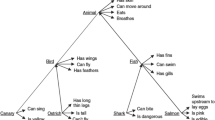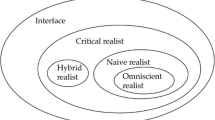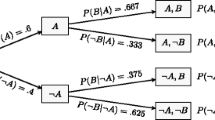Abstract
We review the various explanations that have been offered toaccount for subjects' behaviour in Wason's famous selection task. Weargue that one element that is lacking is a good understanding ofsubjects' semantics for the key expressions involved, and anunderstanding of how this semantics is affected by the demands the taskputs upon the subject's cognitive system. We make novel proposals inthese terms for explaining the major content effects of deonticmaterials. Throughout we illustrate with excerpts from tutorialdialogues which motivate the kinds of analysis proposed. Our long termgoal is an integration of the various insights about conditionalreasoning on offer from different cognitive science methodologies. Thepurpose of this paper is to try to draw the attention of logicians andsemanticists to this area, since we believe that empirical investigationof the cognitive processes involved could benefit from semanticanalyses.
Similar content being viewed by others
References
Almor, A. and Sloman, S. A., 1996, “Is deontic reasoning special?,” Psychological Review 103, 374–380.
Anderson, J.R., 1990, The Adaptive Character of Thought, Hillsdale, NJ: Lawrence Erlbaum.
Athanasiadou, A. and Dirven, R., 1995, “Typology of if-clauses,” pp. 609–654 in Cognitive Linguistics in the Redwoods, E. Casad, ed., Berlin: Mouton De Gruyter.
Athanasiadou, A. and Dirven, R., 1997a, “Conditionality, hypotheticality, counterfactuality,” pp. 61–96 in On Conditionals Again, A. Athanasiadou and R. Dirven, eds., Amsterdam: John Benjamins.
Athanasiadou, A. and Dirven, R., 1997b, On Conditionals Again, Amsterdam: John Benjamins.
Bracewell, R.J. and Hidi, S.E., 1974, “The solution of an inferential problem as a function of stimulus materials,” Quarterly Journal of Experimental Psychology 26, 480–488.
Cheng, K. and Holyoak, K., 1985, “Pragmatic reasoning schemas,” Cognitive Psychology 14, 391–416.
COBUILD, 1980, Collins Birmingham University International Language Database, Birmingham: Collins.
Comrie, B., 1986, “Conditionals: A typology,” pp. 77–99 in On Conditionals, E. Traugott, A. ter Meulen, J.S. Reilly, and C.A. Ferguson, eds., Cambridge: Cambridge University Press.
Cosmides, L., 1989, “The logic of social exchange: Has natural selection shaped how humans reason? Studies with the Wason selection task,” Cognition 31, 187–276.
Evans, J.St.B.T. and Over, D.E., 1996, “Rationality in the selection task: Epistemic utility versus uncertainty reduction,” Psychological Review 103, 356–363.
Evans, J.St.B.T., Newstead, S.L., and Byrne, R.M., 1993, Human Reasoning: The Psychology of Deduction, Hove, Sussex: Lawrence Erlbaum.
Fillenbaum, S.I., 1978, “How to do some things with if,” pp. 40–65 in Semantic Functions in Cognition, J.W. Cotton and R.L. Klatzky, eds., Hillsdale, NJ: Lawrence Erlbaum.
Gebauer, G. and Laming, D., 1997, “Rational choices in Wason's selection task,” Psychological Research 60, 284–293.
Geis, M.C. and Zwicky, A.M., 1971, “On invited inferences,” Linguistic Enquiry 2, 561–566.
Gigerenzer, G. and Hug, K., 1992, “Domain-specific reasoning: Social contracts, cheating, and perspective change,” Cognition 43, 127–171.
Griggs, R.A., 1984, “Memory cueing in instructional effects on Wason's selection task,” Current Psychological Research and Review 3, 3–10.
Griggs, R.A. and Cox, J.R., 1982, “The elusive thematic-materials effect in Wason's selection task,” British Journal of Psychology 73, 407–420.
Haiman, J., 1978, “Conditionals are topics,” Language 54, 564–589.
Henle, M., 1962, “On the relation between logic and thinking,” Psychological Review 69, 366–378.
Horwich, P., 1982, Probability and Evidence, Cambridge: Cambridge University Press.
Johnson-Laird, P.N. and Byrne, R.M., 1991, Deduction, Hove, Sussex: Lawrence Erlbaum.
Johnson-Laird, P.N. and Wason, P.C., 1970, “A theoretical analysis of insight into a reasoning task,” Cognitive Psychology 1, 134–148.
Laming, D., 1996, “On the analysis of irrational data selection: A critique of Oaksford and Chater,” Psychological Review 103, 364–373.
Lewis, D., 1975, “Adverbs of quantification,” pp. 3–15 in Formal Semantics of Natural Language, E. Keenan, ed., Cambridge: Cambridge University Press.
Manktelow, K.I. and Evans, J.St.B.T., 1979, “Facilitation of reasoning by realism: Effect or noneffect?,” British Journal of Psychology 71, 227–231.
Oaksford, M.R. and Chater, N.C., 1994, “A rational analysis of the selection task as optimal data selection,” Psychological Review 101, 608–631.
Oaksford, M.R. and Chater, N.C., 1996, “Rational explanation of the selection task,” Psychological Review 103, 381–392.
Oaksford, M.R. and Stenning, K., 1992, “Reasoning with conditionals containing negated constituents,” Journal of Experimental Psychology: Learning, Memory and Cognition 18, 835–854.
Rose, H. and Rose, S., Alas, Poor Darwin: Arguments against Evolutionary Psychology, London: Jonathan Cape, 2000.
Smalley, N.S., 1974, “Evaluating a rule against possible instances,” British Journal of Psychology 165, 293–304.
Sperber, D. and Wilson, D., 1986, Relevance: Communication and Cognition, Oxford: Blackwell.
Sperber, D., Cara, F., and Girotto, V., 1995, “Relevance theory explains the selection task,” Cognition 57, 31–95.
Stanovich, K.E. and West, R.F., 1998, “Cognitive ability and variation in the selection task,” Thinking and Reasoning 4, 193–230.
Stenning, K. and Levy, J., 1988, “Knowledge-rich solutions to the binding problem: A simulation of some human computational mechanisms,” Knowledge Based Systems 1, 143–152.
Stenning, K., Cox, R., and Oberlander, J., 1995, “Attitudes to logical independence: Traits in quantifier interpretation,” pp. 742–747 in Proceedings of Seventeenth Meeting of the Cognitive Science Society, Pittsburgh, PA, 1995, J.D. Moore and J.F. Lehman, eds., Hillsdale, NJ: Lawrence Erlbaum.
Traugott, E., ter Meulen, A., Reilly, J.S., and Ferguson, C.A., 1982, On Conditionals, Cambridge: Cambridge University Press.
Vallduví, E.E. and Engdahl, E., 1996, “The linguistic realization of information packaging,” Linguistics 34, 459–519.
van Duyne, P.C., 1974, “Realism and linguistic complexity in reasoning,” British Journal of Psychology 65, 59–67.
Wason, P.C., 1965, “The contexts of plausible denial,” Journal of Verbal Learning and Verbal Behaviour 4, 7–11.
Wason, P.C., 1968, “Reasoning about a rule,” Quarterly Journal of Experimental Psychology 20, 273–281.
Wason, P.C. and Green, D.W., 1984, “Reasoning and mental representation,” Quarterly Journal of Experimental Psychology 36A, 598–611.
Wason, P.C. and Johnson-Laird, P.N., 1970, “A conflict between selecting and evaluating information in an inferential task,” British Journal of Psychology 61, 509–515.
Wason, P.C. and Johnson-Laird, P.N., 1972, Psychology of Reasoning: Structure and Content, Boston: Harvard University Press.
Wason, P.C. and Shapiro, D., 1971, “Natural and contrived experience in a reasoning problem,” Quarterly Journal of Experimental Psychology 23, 63–71.
Westerstå hl, D., 1985, “Logical constants in quantifier languages,” Linguistics and Philosophy 8, 387–413.
Yachanin, S.A. and Tweeney, R.D., 1982, “The effect of thematic content on cognitive strategies in the four-card selection task,” Bulletin of the Psychonomic Society 19, 87–90.
Author information
Authors and Affiliations
Rights and permissions
About this article
Cite this article
Stenning, K., van Lambalgen, M. Semantics as a Foundation for Psychology: A Case Study of Wason's Selection Task. Journal of Logic, Language and Information 10, 273–317 (2001). https://doi.org/10.1023/A:1011211207884
Issue Date:
DOI: https://doi.org/10.1023/A:1011211207884




